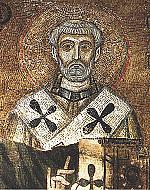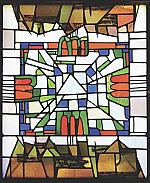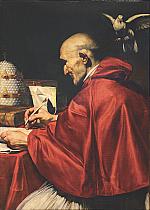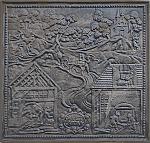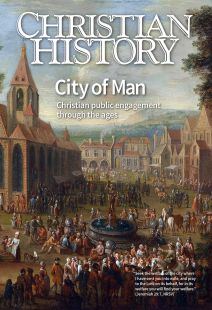Living by a higher authority
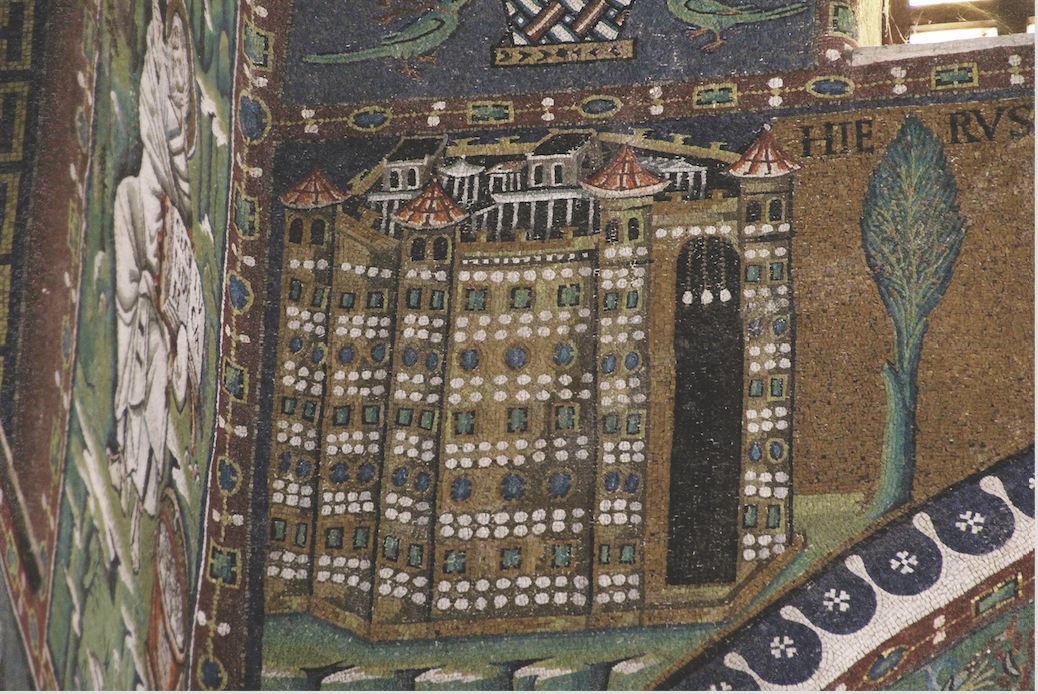
[Above: Ravenna, basilica di San Vitale, apse valt mosaic detail: The New Jeruslaem, 6th C.—Gianni Careddu / [CC BY-SA 4.0] Wikimedia]
To be openly Christian in the ancient world was to be mistrusted and mistreated by one’s fellow citizens. Christians had to walk the streets and share all the forms and features of living within a pagan culture, but they were universally hated and their doctrine was largely misunderstood. In addition to sporadic (and eventually empirewide) persecution, a general posture of incredulity and suspicion existed toward the new faith.
Pagan intellectuals such as Celsus (who wrote around 175), Lucian (c. 125–180), Galen (129–c. 210), Marcus Aurelius (121–180), and Porphyry (c. 234–305) unleashed major theological and moral arguments against the church, and these percolated down into the populace. Celsus was amazed that Christians “invite into membership those who by their own account are sinners: the dishonest, thieves, burglars, poisoners, blasphemers of all descriptions, grave robbers.” He concluded in rhetorical exasperation, “I mean—what other cult actually invites robbers to become members!”
Early Christians knew these arguments well. In his Apology Tertullian (c. 155–c. 220) described growing societal tension and the public outcry “that the State is filled with Christians—that they are in the fields, in the citadels, in the islands: they make lamentation, as for some calamity, that both sexes, every age and condition, even high rank, are passing over to the profession of the Christian faith.”
Yet early believers showed no signs of panic. No frantic voices called Christians to retreat from the culture or to take up arms in violence. Instead they exhibited a steady commitment to learn the art and practice of living Christianly within a pagan culture. They did not try to establish their own political structures, but rather, taking their cues from Paul in Romans 13:1–7 (see p. 11), they trusted in God’s sovereignty and accepted their lot. That was, of course, no easy task.
Enduring and persevering
From the very beginning, the early church believed that theological claims about the nature of God have political implications. Convicted that this world belongs to the God of the Bible, early Christians recognized him as the higher authority to whom they owed their allegiance—not Zeus, or the emperor, or any other government official.
As history shows, that loyalty landed early Christians into martyrdom, but still they appealed to this divine transcendence and providence. For this reason Christians such as Polycarp (69–155) and Perpetua (c. 182–c. 203) did not run and hide, but endured and persevered—because the creator and sustainer of all life had been revealed to them.
Living by this assumption of divine transcendence and providence, the church never developed a particular “strategy” or “method” of cultural engagement. Christians were not anxiously looking for the latest program or innovation to help them cope with or combat the cultural moment. Instead they focused on building the church from within.
Leaders wrote catechetical works (such as Irenaeus’s On the Apostolic Preaching [c. 175–189]) to help impart Christian doctrinal distinctives to new converts, as well as handbooks that helped the community to cultivate a spiritual life guided by moral and liturgical distinctives (such as the Didache [c. 75–150] and On the Apostolic Tradition [c. 220]). They understood that cultural engagement began not on the streets, but within the gathered community—united through catechesis, discipleship, and regular patterns of liturgical life.
As early Christians lived by their doctrinal convictions and within the liturgical rhythms of the Christian life, they did not retreat from their cultural surroundings. They had regular intellectual and social interactions that required constant discernment: what degree of participation in Roman culture was compatible with Christian faith?
The Christian apologetic text Epistle of Diognetus from the second or early third century states that Christians are not distinguished “by country, language, or custom.” They had no restriction from enjoying external, material qualities of geographical location, dress, food, or ways of life. Instead, the epistle goes on to say that Christians
live in both Greek and barbarian cities, as each one’s lot was cast, and follow the local customs in dress and food and other aspects of life, at the same times they demonstrate the remarkable and admittedly unusual character of their own citizenship. They live in their own countries, but only as aliens; they participate in everything as citizens, and endure everything as foreigners. Every foreign country is their fatherland, and every fatherland is foreign.
Saying no to this
Members of the early church committed to the tenets of good citizenship: they recognized Caesar’s authority, paid their taxes, and obeyed civil laws—becoming what early apologists could argue were the most faithful and dedicated citizens of all.
Following the examples of Joseph and Daniel and the exhortations of Peter and Paul, Christian pastors and theologians regularly taught the faithful to be loyal and respectful to the state (even when ruled by evil emperors), pay all taxes, and live peacefully among all people. In these respects they did not break the law or commit acts of immorality. If they did, they expected to be punished to the full extent of the law.
On the other hand, this loyalty and respect was
bound by Christian conscience and conviction. The church had to say “no” to common practices and rituals such as astrology, fortune-telling, and sexual promiscuity. Citing Romans 8:5, the Epistle of Diognetus argues that Christians “are ‘in the flesh,’ but they do not live ‘according to the flesh.’ They live on earth, but their citizenship is in heaven. They obey the established laws; indeed in their private lives they transcend the laws.”
At the same time, the church’s activities meant that Christians encountered non-Christians through casual, everyday contacts. They built relationships and regularly invited others to join their community. Their appeal was based on the assumption that what the Christian community had to offer was more fulfilling and more wonderful than any alternative.
Not everyone in the ancient world appreciated the church’s civic engagement. For example, Celsus complained that the Roman philosophical and religious communities appealed to the so-called righteous, while Christianity appealed to sinners.
Celsus noted that Roman cults said, “Whoever has a pure heart and wise tongue, or else, whoever is free of sin and whose soul is pure—you are righteous and good—come forward.” But Christians said whoever “is a sinner, whoever is unwise, whoever is childish—yea, whoever is a wretch—his is the kingdom of God.” Christians had no pretense about whom they invited. Christ welcomed the broken and the sinners, and the early church believed Christ called it to do the same.
Overnight transformation
The gradual work of church cultural engagement eventually paid off. The church grew at a steady pace, gaining more converts with each passing generation. The situation changed, however, with the rise of Constantine (c. 272–337), who came to the throne in 306. Almost overnight Christians went from being mistrusted and abused to being favored. Constantine ended formal persecution in 313 and began building churches all over the empire. Optimism surged among clergy. Church historian Eusebius’s Life of Constantine (early fourth century) and Ecclesiastical History (c. 323–324) picture Constantine as a new Moses, leading people out of the darkness of paganism and into an age of Christendom:
. . . the sight which had been desired and prayed for by us all; feasts of dedication in the cities and consecrations of the newly built houses of prayer took place, bishops assembled, foreigners came together from abroad, mutual love was exhibited between people and people, the members of Christ’s body were united in complete harmony.
The hope of Christendom, a civil society permeated with Christian authorities, where Christianity was the dominant force, was now possible. But this hope would not deliver. As the relationship between church and civil society fundamentally transformed, the church struggled to maintain purity amid political pressures.
Where is God?
This struggle paved the way for the work of Augustine (354–430). A momentous event in the empire’s history set him on a course to write one of his most important contributions: City of God. In 410 the citizens of Rome watched in horror as Alaric the Visigoth sacked Rome. Those left to pick up the pieces, longing to return to the former glory of the empire, began asking, “Where is the Christian God now?”
Augustine rejected the Eusebian and Constantinian view that equated the kingdom of God with the kingdom of Rome. Instead he cast a different vision of the relationship between church and state and a wiser pathway for Christian civic engagement. He began with a proper understanding of humanity in relationship with God. Whereas the great Greek philosophers Plato (c. 428–348 BC) and Aristotle (384–322 BC) had seen political order as a natural consequence of human existence, Augustine argued that humanity is naturally social but not naturally political; no need for a state existed prior to the Fall, nor for the state to bear the sword. Before the Fall Adam and Eve had rightly ordered loves, loving God and neighbor in harmony and peace:
[God] did not intend that His rational creatures, made in His own image, should have lordship over any but irrational creatures: not man over man, but man over beasts. Hence, the first just men were established as shepherds over flocks, rather than as kings of men.
The Fall disturbed this state, fundamentally changing the way people relate to God and to each other. For Augustine self-love and destructive desires now governed humanity. Beneath all social interactions lurked the lust for power and the pursuit of personal glory and material riches. Political order became necessary to mediate between expressions of these disordered loves.
Christians, however, should not concentrate all their efforts in political and public arenas, he thought. Despite his willingness to cooperate with the state at times, he believed that God’s ultimate plan does not revolve around the state, but the church. Here he distinguished between the City of God and the City of Man:
Two cities, then, have been created by two loves; that is, the earthly by the love of self extending even to contempt of God, and the heavenly by love of God extending to contempt of self. The one, therefore, glories in itself, the other in the Lord; the one seeks glory from men, the other finds its highest glory in God, the witness of our conscience. . . . In the Earthly City, princes are as much mastered by the lust for mastery as the nations which they subdue are by them; in the Heavenly, all serve one another in charity, rulers by their counsel and subjects by their obedience. The one city loves its own strength as displayed in mighty men; the other says to its God, “I will love Thee, O Lord, my strength” [Psalm 18:1].
The faithful will dwell with God
True Christian citizenship, therefore, is determined by what one loves. If one loves God, he or she is a citizen of heaven. Those who reject God are merely citizens of an earthly, temporal kingdom. In this life, Augustine thought, the two cities are mixed, with Christians living as pilgrims on a journey toward the final revelation of the City of God.
In the end, and amid all political and public interactions, the chief good is everlasting life with God. Augustine described this in the closing lines of the City of God; in the heavenly city, the faithful “will be redeemed from all evil and filled with every good thing, constant in its enjoyment of happiness of eternal rejoicing; forgetting offences and forgetting punishments.” They will dwell with God and “shall rest and see, see and love, love and praise.”
This hope pointed the faithful to the eternal realities of the gospel again and again throughout the writings of the early church, and no doubt it was attractive for those outside the church as well. Momentary persecutions and cultural rejection paled for early Christians compared with the beauty of hope of eternal life with God, dwelling with God forever.
As the church of the twenty-first century charts its own course for cultural engagement, may the wisdom of the early church’s steady commitment to the art and practice of living Christianly in a pagan culture encourage us; at the same time, may Augustine’s theological vision continue to remind the church that “to discover the character of any people, we have only to examine what it loves.” CH
By Stephen Presley
[Christian History originally published this article in Christian History Issue #141 in 2021]
Stephen Presley is associate professor of church history and director of research doctoral studies at the Southern Baptist Theological Seminary. He also serves as a Fellow at the Center for Religion, Culture, and Democracy and is currently at work on a book about cultural engagement in the early church.Next articles
“Seek the welfare of the city”
Some famous Scripture passages that have guided very different approaches to civic engagement
Inside the monastery gates
A chief way monasteries engaged with their communities was showing hospitality
Support us
Christian History Institute (CHI) is a non-profit Pennsylvania corporation founded in 1982. Your donations support the continuation of this ministry
Donate



